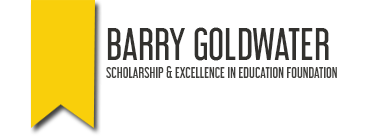ELIGIBILITY CRITERIA
Accredited 2- and 4-year U.S. academic institutions that have a Foundation identified Goldwater Campus Representative may nominate up to four currently or previously matriculated students annually. A student may not be nominated by more than one institution in a competition cycle. A four-year school may nominate a 5th student if one or more of the nominated students is a transfer student or U.S. Veteran. They may nominate up to six students if they have both a transfer student and a U.S. Veteran. No direct student applications or nominations by campuses without a Goldwater Campus Representative will be considered.
To be eligible for nomination for a Goldwater Scholarship, a student must:
1. Be a matriculated sophomore or junior pursuing a degree at an accredited 2- or 4-year institution of higher education and be a full-time matriculated student during the academic terms when receiving scholarship support from the Foundation.
2. Intend to pursue a research career in a natural science, mathematics or engineering,1
3. Have a college grade point average of at least a 3.00 on a 4.00 scale 2, and
4. Be a U.S. citizen or national from the 50 States, District of Columbia, Commonwealth of Puerto Rico, Guam, United States Virgin Islands, American Samoa, Commonwealth of the Northern Mariana Islands, Republic of the Marshall Islands, Federated States of Micronesia, Republic of Palau, and any other territory or possession of the United States; or a permanent resident. A permanent resident must submit a photocopy of their Permanent Resident Card, also known as a Green Card.
1The natural sciences, engineering, and mathematics fields and sub-fields used by the Goldwater Foundation to determine eligibility are those used by the National Science Foundation for its Graduate Research Fellowship Program. These include: Chemistry, Computer and Information Sciences and Engineering, Engineering, Geosciences, Life Sciences, Materials Research, Mathematical Sciences, Physics and Astronomy, and Psychology. To view a field’s sub-fields, click on the field in the table below.
While research in medicine is not supported by the National Science Foundation, students interested in pursuing careers in medicine or veterinary medicine are eligible for a Goldwater Scholarship IF RESEARCH IS A CENTRAL PART OF THE STUDENT’S CAREER GOALS.
2In recent Goldwater competitions, GPAs have ranged from 3.3 to 4.95 on a 4.0 scale.
Fields of Study
- Chemistry
- Computer & Information Sciences & Engineering
- Engineering
- Geosciences
- Life Sciences
- Materials Research
- Mathematical Sciences
- Medicine
- Physics & Astronomy
- Psychology
